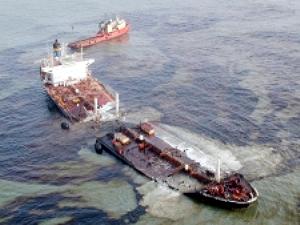 On July 27, 2003, the oil tanker Tasman Spirit ran aground at the entrance to the port city of Karachi. Laden with sweet crude, the vessel lay beached for two weeks before eventually breaking up and spilling 35,000 tons (10,780,000 gallons) of her cargo into the bay, from which an estimated 11,000 metric tons of toxic gasses known as Volatile Organic Compounds (VOCs) evaporated into the air.
On July 27, 2003, the oil tanker Tasman Spirit ran aground at the entrance to the port city of Karachi. Laden with sweet crude, the vessel lay beached for two weeks before eventually breaking up and spilling 35,000 tons (10,780,000 gallons) of her cargo into the bay, from which an estimated 11,000 metric tons of toxic gasses known as Volatile Organic Compounds (VOCs) evaporated into the air.
Fumes from the volatile organic compounds and mist containing hydrocarbons, accompanied by a strong smell, dispersed into the residential area, the researchers and others said. Local hospitals reported many cases of headaches, nausea and dizziness and seventeen schools in the vicinity were closed for about a week. Local media showed pictures of piles of dead fish and turtles on the oiled beach.
The tragic incident so close to a large city provided a chance to test the effects of oil spill VOCs on densely populated areas. Immediately following the spill, researchers began to study the health impact of the noxious fumes on the city’s approximately 700,000 affected residents.
